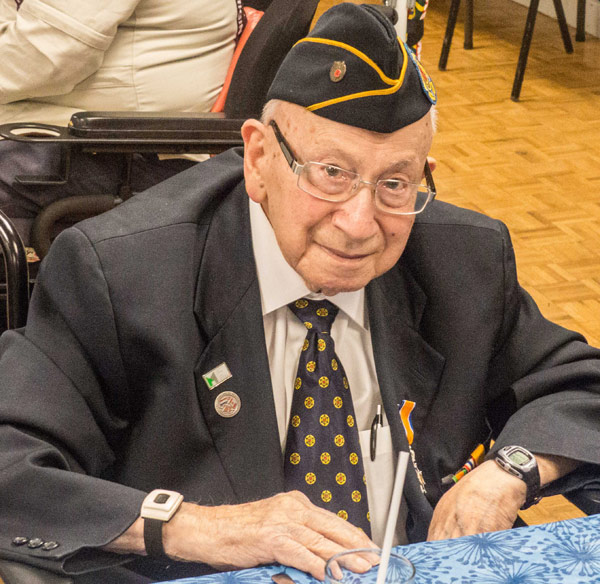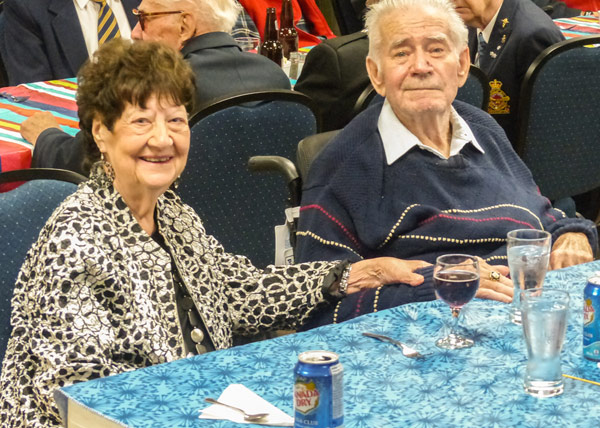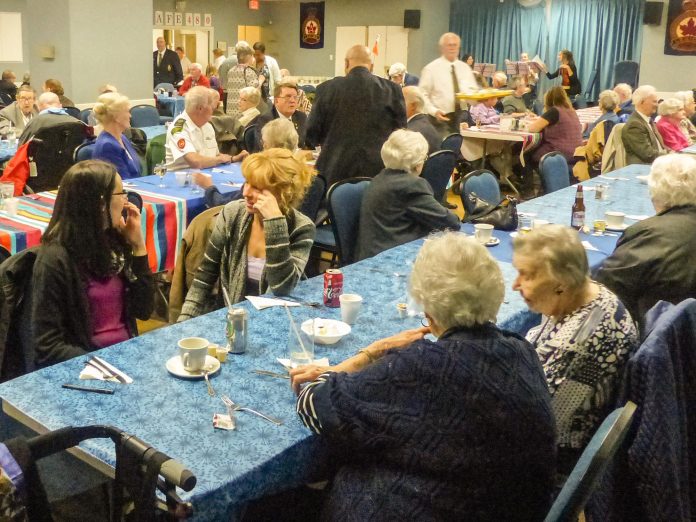By Judith van Berkom –
Imagine if you woke up to find your world changed beyond recognition by an atomic bomb; everything and everyone familiar, gone. Houses replaced by rubble, and a quiet that could be felt. John Franken, who worked nights in the mines of Nagasaki, woke to such a world on August 9, 1945.
“There’s a room full of stories here,” says Dean McCuaig, a volunteer with the Westboro Legion.
The Veterans’ Dinner is an annual event at the Westboro Legion. Veterans dine free of charge, and the general public is invited to share a meal – and maybe a story or two – with a veteran.
The crowd usually includes WWII veterans, retired peace keepers, veterans of the Korean War, Afghanistan, and Desert Storm in the Persian Gulf. Approximately 100 veterans with their spouses and families gathered in the Legion on October 20, 2015.
Accompanied by a classical string trio from Lisgar Collegiate High School, the evening started at 4 p.m., giving veterans and their families time to settle in, have a drink, and chat with fellow veterans. Dinner followed at 5 p.m., and the evening was piped out at 6:30 p.m. by piper, Evelyn Brunton.
John Franken, now 93, was one of the dinner guests.
Born on the island of Java, Indonesia, the former Dutch West Indies, Franken remembers how quickly everything changed during that chaotic time. Japan invaded Borneo and less than three months after the first attacks, the Japanese navy and army overran Dutch and allied forces. Between 1942 and 1945, Japan occupied Indonesia.

Franken, whose ship was captured by the Japanese, became a prisoner of war. Initially, he and fellow POWs were put to work converting schools into brothels. Franken witnessed girls as young as 14 being picked off the streets to serve as ‘Comfort Women’ for Japanese soldiers. He volunteered to work in the coal mines because he got to have a shower every day.
‘Tea at the Embassy’ is an award-winning documentary made about Franken’s life during the war, and later, as an activist, relentlessly lobbying the Japanese government to apologize for war crimes committed during WWII.
“The atomic bomb saved my life,” says Franken. He emerged from a night at work in the coal mine in Nagasaki on August 9, 1945 to the after effects of the atomic bomb. The British army liberated the POWs a day later. He is the only remaining Canadian Nagasaki atomic bomb survivor. In 2007, he was awarded the Netherlands Medal of Orange-Nassau by Queen Beatrix (comparable to being knighted). His wife, Sonja, passed away in 2014.
The Legion dinner was a simple meal of Shepherd’s pie with cake and coffee for dessert. The annual event is an opportunity for veterans to come together and socialize with fellow veterans and their families.
“It was the Branch 480 Legion Ladies Auxiliary who provided the meal for the Veterans Dinner, and they take pride in doing so,” says McCuaig. “It allows us to keep the costs low as there is no cost to the Veteran and his/her guest. Costs are covered by the Poppy Fund.”

Although the situation for veterans seems to be improving – there’s recognition of the psychological effects of serving in a war, of the importance of providing help to veterans suffering from post-traumatic stress disorders – dinner conversation turned to the plight of veterans living on the streets of Ottawa.
“Vets are building houses for vets. It shouldn’t be that way,” says one distressed veteran. “I hope our new government recognizes the problems and takes them off the streets,” he adds.
Veterans of WWII and the Korean War were given housing and paid to go to school when they returned from the war. As one of the veterans explained: “there was room for housing and jobs back then, but now we are in a stagnant time. We have trouble finding jobs for our young people, let alone for veterans.”
